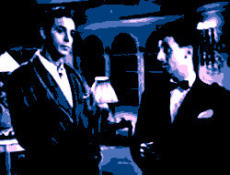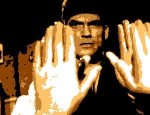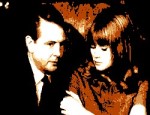Film Review
Jean Stelli's main claim to fame is that he directed
Le
Voile bleu (1942), one of the biggest hits at the French box
office during the years of Occupation, but he directed thirty other
films over a wide range of genres, mostly mainstream fodder that is
instantly forgettable. These include light comedies such as
Une fille sur la route, a suitable
vehicle for popular singer Georges Guétary just as he was
gaining international celebrity. In this dull but amiable musical
comedy, Guétary is improbably paired with Jean Lefebvre, a comic
actor who was almost ubiquitous in French comedies of the 1960s and is
best remembered today for playing Fougasse in Louis de Funès'
Gendarme films.
Putting the moderately talented comedian Lefebvre next to the
hyper-charismatic Guétary in a scene makes as much sense as
putting a low energy light bulb next to a flood light.
Guétary's pairing with Liliane Bert is almost as ill-advised (if
there's any chemistry between the two actors it's hard to see with the
naked eye) and for once the old Guétary magic seems to be
missing - and it is not hard to see why. The script is laughably
pedestrian (in fact, it's mostly a rip-off of an earlier Tino Rossi
film,
Sérénade aux nuages)
and Stelli's direction is, who would think it, implacably dull.
The musical numbers are not great but, enthusiastically performed by
Guétary, they are the only thing to reward the effort of
watching the film. After Guétary's previous film
appearance, in
An American in Paris (1951),
Une fille sur la route must have
felt like one Hell of a come down.
© James Travers 2015
The above content is owned by frenchfilms.org and must not be copied.
Film Synopsis
To escape the hoards of female admirers that are constantly haranguing
him, singer Carlos Cortez heads for the Côte d'Azur, hoping to
spend a quiet holiday under his real name, Jacques Gary.
Unfortunately, all of the Riviera hotels are full and, unwilling to
reveal his true identity to gain preferential treatment, he accepts an
invitation to stay with a group of campers. The latter include
Annabel, a young hitchhiker who forced him into giving her a lift in
his limousine. Jacques's hopes of a peaceful retreat into
anonymity are dashed when he becomes implicated in a jewel
robbery. Only the enterprising Annabel can unmask the real jewel
thief, but he proves to be more cunning that she
thought...
© James Travers
The above content is owned by frenchfilms.org and must not be copied.



